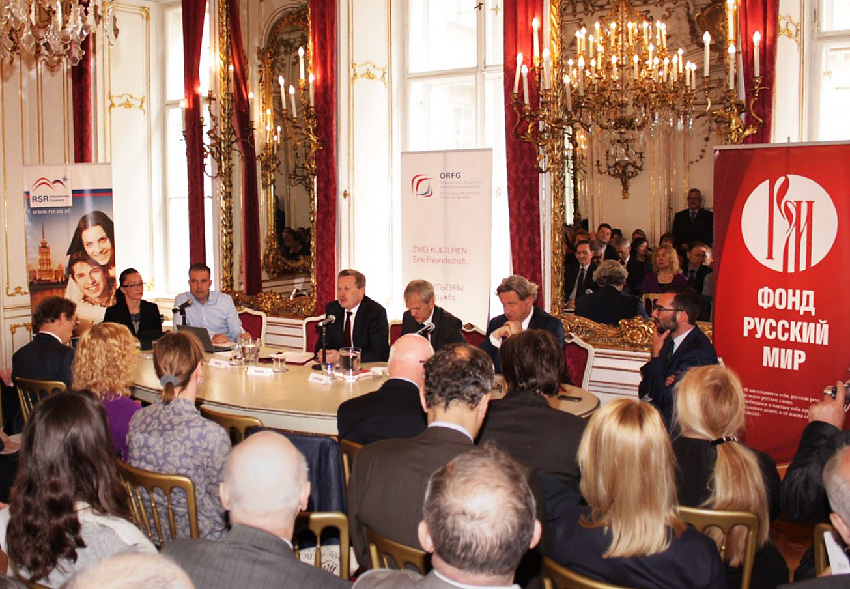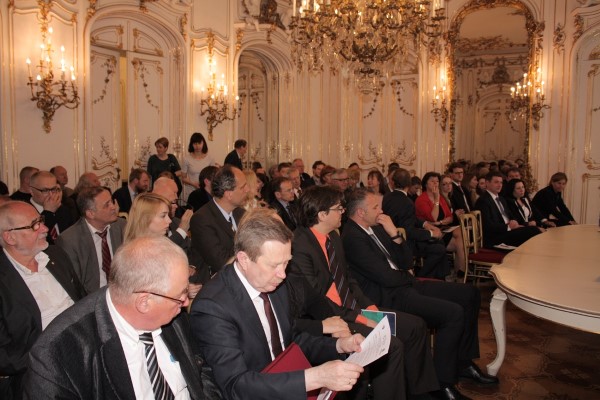
Exemplary Bilateral Russia-Austria Relations
/ Главная / Russkiy Mir Foundation / Publications / Exemplary Bilateral Russia-Austria RelationsExemplary Bilateral Russia-Austria Relations
The conference “Relations between Austria and Russia. Past, Present, Future” was presupposed by its organisers to demonstrate the need to return the relations between EU member states and Russia to normal.
The conference “Relations between Austria and Russia. Past, Present, Future” took place at Kaiser Villa on May 25; it was held under the auspices of the Russian Embassy in Austria.
The conference had been initiated by the Russkiy Mir Foundation, Russian Center of Science and Culture in Vienna, the Austrian-Russian Friendship Society, which includes over 3000 enthusiasts of friendship with Russia. Taking the importance of the forum’s topic into account, it was held under the auspices of the Russian Embassy in the Austrian Republic. The Austrian-Russian Friendship Society also took part in preparing the conference.

As envisioned by the conference organisers, it is supposed to show the need to return the relations between EU member states and Russia to normal, based on good neighbourhood and cooperation. One of nice examples of mutual understanding and trust, between Russia and European countries existing even now, is Austria.
The conference participants noticed, that the history of Russia-Austria relations has its own ups and downs, it experienced conflicts and friendship, but all in all, it remained stable and political environment did not affect it much, it did not have crucial problems.
One of explanations is the geographical proximity and absence of similar geopolitical interest. Having been in the opposed military camps for a long time during the battles of the World War I, the Russians and Austrians had to give up the image of great sovereignty.
After the fall of the Austria–Hungary, the Russian Empire also collapsed. The conference participants mentioned that one of the most important historical events, which significantly strengthened the bilateral relations, was the role of the Soviet Union in freeing Austria from the Nazi’s ruling in April 1945, which was achieved at great cost of life and the constructive role of the Russian diplomacy, when concluding the Austrian State Treaty in 1955.
– Russia-Austria relations can be indeed considered exemplary, commented the Russian Ambassador in Austria D. Lyubinskiy. – The results of visits of the Russian President V. Putin to Vienna and Federal President H. Fischer in 2014 and 2016 confirmed the high level of confidence and the willingness to extend strategic partnership.
Russian economic recession, also triggered by the anti-Russian sanctions, reduced the mutual commodity turnover – a part of total 1200 Austrian firms in the Russian market, decided to leave it. But still, the Austrian conference participants are sure that the Russian market is attractive and promising one for the European investors.
One of the tasks of extending the Russian-Austrian commercial and economic cooperation is extending and diversifying the Russian export to Austria, which is only represented today by energy sources.
The Austrian conference participants expressed themselves in favour of prompt cancellation of the anti-Russian sanctions.
– French and Italian members of parliament were the first to have recently raised their voice for cancellation of the anti-Russian economic sanctions imposed by the European Union, said Secretary General of the Austrian-Russian Friendship Society Florian Schtermann. – Thus, we have to convince our Austrial parliamentarians and politicians both to declare the need to continue dialogue with Europe, and to support these words with actual actions, using the opportunities of the European Commission and other European forums.

– Russia did not forget that Austria did not support imposing sanctions against Russia, said Executive director of the Russkiy Mir Foundation Vladimir Kochin at the opening of the ceremony. – What comes to Russia, despite re-orientation of its foreign policy to the East and extension of is cooperation with SCO, BRICS and CIS countries, it is still continuing the cooperation with Austria almost in all the spheres it used to cooperate in before.
The Russian participants expressed their hope, that the neutral status of Austria will be used by the Austrian politicians in order to relieve the tension connected with the current geopolitical conflicts, including the Ukrainian crisis, Armenian-Azerbaidzhan conflict in Nagorny Karabakh and other regions. A pleasant chance connected with a recent victory of the new Austrian President Alexander van der Bellen, is now on. It is known that he has Russian background and, in addition, Austria is going to chair the OSCE in 2017.
Bilateral conference in Vienna has aroused much interest in Austria, politicians and businessmen, public figures and journalists took part in it. The total amount of visitors was over a hundred persons.
Russian participants of the conference included the senior officials of the Institute of Europe of the Russian Academy of Science, the Russian State University of Technology, Moscow Trade and Industry Chamber, Russkiy Mir Foundation, embassies of Russia and Austria. Austria was represented by the members of Austrian Entrepreneurs Association, Austrian Economic Chamber, Institute of International Economic Relations of Eisenstaedt, Universities of Vienna, Salzburg and Graz.
The conference in Vienna is a connecting link in a series of conferences in the adequate subject of bilateral relations of Russia with European countries, conducted by the Russkiy Mir Foundation.
Last year, two conferences of this series on Russian-German relations were held in Moscow and Berlin and at the beginning of December 2016, a conference in the Embassy of the Grand Duchy of Luxembourg in Moscow, analyzing the good neighbourhood relations between Russia and Luxembourg and dedicated to the 125th anniversary of establishing diplomatic relations between the two countries, will be held.
New publications

 Mikhail Kalatozov, a director who transformed the world of cinematography in many ways, was born 120 years ago. He was a Soviet film official and a propagandist. Above all, he was capable of producing movies that struck viewers with their power and poetic language.
Mikhail Kalatozov, a director who transformed the world of cinematography in many ways, was born 120 years ago. He was a Soviet film official and a propagandist. Above all, he was capable of producing movies that struck viewers with their power and poetic language.  Ukrainian authorities have launched a persecution campaign against the canonical Ukrainian Orthodox Church (UOC), the biggest one in the country's modern history. Over the past year, state sanctions were imposed on clergy representatives, searches were conducted in churches, clergymen were arrested, criminal cases were initiated, the activity of the UOC was banned in various regions of the country, and monasteries and churches were seized.
Ukrainian authorities have launched a persecution campaign against the canonical Ukrainian Orthodox Church (UOC), the biggest one in the country's modern history. Over the past year, state sanctions were imposed on clergy representatives, searches were conducted in churches, clergymen were arrested, criminal cases were initiated, the activity of the UOC was banned in various regions of the country, and monasteries and churches were seized.  When Nektary Kotlyaroff, a fourth-generation Russian Australian and founder of the Russian Orthodox Choir in Sydney, first visited Russia, the first person he spoke to was a cab driver at the airport. Having heard that Nektariy's ancestors left Russia more than 100 years ago, the driver was astonished, "How come you haven't forgotten the Russian language?" Nektary Kotlyaroff repeated his answer in an interview with the Russkiy Mir. His affinity to the Orthodox Church (many of his ancestors and relatives were priests) and the traditions of a large Russian family brought from Russia helped him to preserve the Russian language.
When Nektary Kotlyaroff, a fourth-generation Russian Australian and founder of the Russian Orthodox Choir in Sydney, first visited Russia, the first person he spoke to was a cab driver at the airport. Having heard that Nektariy's ancestors left Russia more than 100 years ago, the driver was astonished, "How come you haven't forgotten the Russian language?" Nektary Kotlyaroff repeated his answer in an interview with the Russkiy Mir. His affinity to the Orthodox Church (many of his ancestors and relatives were priests) and the traditions of a large Russian family brought from Russia helped him to preserve the Russian language.

 The leaders of the Friends of the Great Russia cultural association (Amici Della Grande Russia) in Italy believe that the Western policy of abolishing Russian culture in Europe has finally failed. Furthermore, it was doomed to failure from the beginning.
The leaders of the Friends of the Great Russia cultural association (Amici Della Grande Russia) in Italy believe that the Western policy of abolishing Russian culture in Europe has finally failed. Furthermore, it was doomed to failure from the beginning.  Name of Vladimir Nemirovich-Danchenko is inscribed in the history of Russian theater along with Konstantin Stanislavski, the other founding father of the Moscow Art Theater. Nevertheless, Mr. Nemirovich-Danchenko was a renowned writer, playwright, and theater teacher even before their famous meeting in the Slavic Bazaar restaurant. Furthermore, it was Mr. Nemirovich-Danchenko who came up with the idea of establishing a new "people's" theater believing that the theater could become a "department of public education."
Name of Vladimir Nemirovich-Danchenko is inscribed in the history of Russian theater along with Konstantin Stanislavski, the other founding father of the Moscow Art Theater. Nevertheless, Mr. Nemirovich-Danchenko was a renowned writer, playwright, and theater teacher even before their famous meeting in the Slavic Bazaar restaurant. Furthermore, it was Mr. Nemirovich-Danchenko who came up with the idea of establishing a new "people's" theater believing that the theater could become a "department of public education."  "Russia is a thing of which the intellect cannot conceive..." by Fyodor Tyutchev are famous among Russians at least. December marks the 220th anniversary of the poet's birth. Yet, he never considered poetry to be his life's mission and was preoccupied with matters of a global scale. Mr.Tyutchev fought his war focusing on relations between Russia and the West, the origins of mutual misunderstanding, and the origins of Russophobia. When you read his works today, it feels as though he saw things coming in a crystal ball...
"Russia is a thing of which the intellect cannot conceive..." by Fyodor Tyutchev are famous among Russians at least. December marks the 220th anniversary of the poet's birth. Yet, he never considered poetry to be his life's mission and was preoccupied with matters of a global scale. Mr.Tyutchev fought his war focusing on relations between Russia and the West, the origins of mutual misunderstanding, and the origins of Russophobia. When you read his works today, it feels as though he saw things coming in a crystal ball...